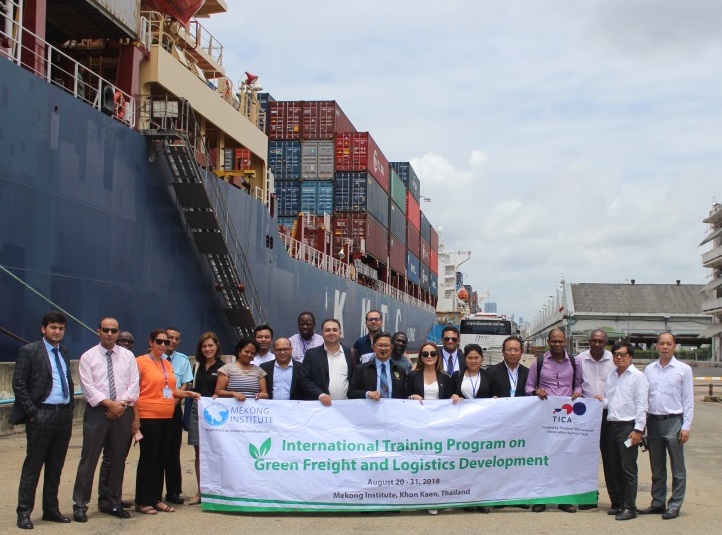The International Training on Green Freight and Logistics Development 2018 ended on a high note, with structured learning visits capping its two-week run. The training, held on August 20-31, 2018 was implemented by Mekong Institute (MI) and sponsored by the Thailand International Cooperation Agency (TICA).
The two-week training program was structured into two parts comprising of training program and structured learning visits (SLVs). A total of nineteen (19) participants mainly mid-level officials, academic institutions and members of logistics associations from Burundi, Cambodia, Egypt, Ethiopia, Iran, Jordan, Kyrgyz Republic, Lao PDR, Madagascar, Malawi, Morocco, Panama, Sri Lanka, Tajikistan, Tanzania, Tunisia and Zambia, participated in the course.
The training covered interrelated modules on green logistics; green freight certification process; preparing companies for green logistics; policy and consumer awareness; e-logistics in supply chain management; and the role of the government in promoting green logistics. MI resource persons as well as regional and international experts with considerable experience in green and sustainable freight and logistics planning and management, delivered the sessions.
Capping off the in-house lectures at MI were the structured learning visits organized in Bangkok. Participants visited the Lat Krabang Inland Container Depot (ICD); Thai International Freight Forwarders Association (TIFFA) ICD; and the Bangkok Port. The visits enabled the participants to learn best practices in the green freight and logistics sector in Thailand, particularly in the key elements of transport and logistics management, effective logistics operation, and green port development of the country.
Following the two-week course, participants are to implement action plans (APs) they designed during the course as an exercise to facilitate the transfer of knowledge and skills gained from the training in their respective organizations and countries. The APs can range from organization of training programs, workshops or seminars; formulation of laws and regulations related to green freight and logistics; introduction of renewable energy to logistics sector; to the development of e-docs, e-port permit issue and e-logistics system; development of green freight and logistics strategy, policy and plan; conduct feasibility study; and development of database for linking green transport structure.
MI will monitor and track the implementation of these APs and the progress will be reported accordingly to TICA. A similar training program will be organized again in May 2019.








